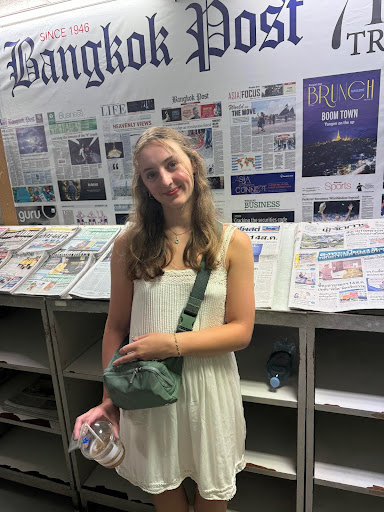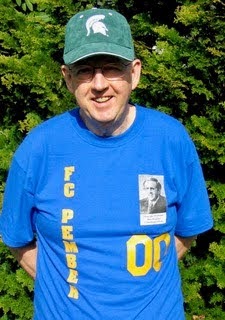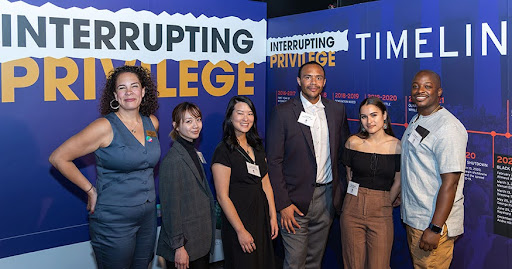A BIG husky welcome to our newest alumni!
UW Communication welcomes the class of 2024 to the alumni pack! Our alumni network is a strong and vibrant community tens of thousands strong. We’re delighted that this incredible group of graduates is joining its ranks.
As they prepared for graduation last spring, over 400 graduates submitted photos from their journeys as Huskies at the University of Washington and as students in one of our undergraduate programs (Communication and Journalism and Public Interest Communication) or our graduate programs (Communication Leadership, MA in Communication, PhD in Communication). These photos were hand-selected by our graduates to represent the memories, friendships, and experiences they carry with them into their post-UW adventures.
From study abroad experiences, to student organization events, to Husky game days, and everything in between, Communication students have exemplified what it means to be a student at the University of Washington.
We will miss seeing the class of 2024 in our halls and classrooms, but we are tremendously excited to witness their next accomplishments.
Welcome, 2024 Communication alumni!
Paving the Way: New Department Initiative Addresses Graduate School Pipeline

This school year marks the launch of the Emerging Scholars in Communication Program – an initiative that aims to expand understanding of, and access to, graduate education for promising students from underrepresented groups. Over the course of a 4-week workshop series, program participants will learn from current graduate students and faculty about the experience of graduate school and what it can offer, as well as key elements of a strong application.
The Emerging Scholars in Communication program emerged in response to the climate of graduate education in the discipline. Currently, according to the National Communication Association only 23% of the doctorates awarded in 2020 went to students from underrepresented racial backgrounds. The Council of Graduate Schools also reported a demonstrated decline in first-time enrollments among students from underrepresented groups between Fall 2021 and Fall 2022. These statistics reflect the urgency for a program that introduces a greater diversity of undergraduate students to the possibilities of doctoral work in Communication and demystifies the application process.
Motivated by her own experiences, the inaugural Program Director, Dr. Timeka Tounsel, is eager to respond to this need: “This program is important to me because I remember how difficult it was to get into graduate school. No one had spoken to me about the possibilities of doctoral education until my senior year. By the time I decided to pursue a PhD, there were only a few weeks left to research programs and apply. I remember how clueless I felt once my program started. It took years to get to a point where I no longer felt like an impostor.” The Emerging Scholars in Communication Program seeks to help students by filling in these gaps. Speaking to students, Speaking directly to the students, Dr. Tounsel said,“I want your experience to be better.”
Dispatches from journalism students reporting abroad

(Photo courtesy of Aspen Anderson)
Three of UW Journalism and Public Interest Communication (JPIC) students spent their summer immersing themselves in a journalism environment outside the U.S. as part of a longstanding international reporting internship program generously sponsored by a Communication alumna. The program provides students the opportunity to intern at news outlets in a variety of countries, covering local stories and discovering more about the world. This year’s interns worked for publications in Thailand, Samoa, and India.
Mari Kanagy, a 2024 Communication graduate, spent her time writing for Citizen Matters, a civic media platform dedicated to reporting on critical urban issues in Chennai, India. “I have been interested in traveling to India since I took a class on Eastern religions a few years ago,” says Kanagy. The program provided a great opportunity to travel and invaluable journalism experience.
Kanagy says she leaves the experience with a greater understanding of the universal elements of journalism, whether she’s reporting in Seattle or Chennai. “With every story, I try to understand and communicate how the story relates to the public interest,” she says.
In her free time in Chennai, she explored the city with local friends, shopped at antique stores, and visited the coastal city’s many beaches.
“Every day, I faced a new challenge, whether it was conducting an interview through a translator or taking a rickshaw across town,” says Kanagy.
Over 7,000 miles from Chennai, Aspen Anderson faced similar adventures and challenges in Thailand, where she worked for the Bangkok Post, the country’s newspaper of record. “Little things like navigating Thai washing machines, learning currency conversions, using the bus, the oven, greeting someone in an interview, and deciding whether to eat fresh fruit, veggies, and street food all add up,” says Anderson.
From the moment she joined the JPIC program, Anderson was eager to study abroad with an experience that would align with her career goals. As a 2024 graduate of the Department, she spent her summer doing just that, reporting for the Post.
Anderson says the skills she learned in the classroom with faculty members John Tomasic and Andrea Otáñez, in addition to her participation in the Olympia Statehouse reporting program, equipped her with the essentials she needed to succeed as a journalist abroad.
“Without this foundation, doing quality work in a foreign country with minimal editorial direction would be nearly impossible,” she says. Anderson notes that one thing she learned from this new communication environment was to reflect on the pace with which she approaches her work. “People at my paper constantly reminded me to ‘slow down,’ and that ‘journalism takes time,’” she says.
Among the stories she worked on during her time in Bangkok, Anderson was particularly interested in those focused on the dynamic Thai legal system. “After I wrote a story on the passage of marriage equality, a local same-sex couple reached out to me, sharing their story about having to leave the country to have a child via surrogacy. Their child is now on a tourist visa, and only one of the dads has legal rights to the baby in Thailand. When something significant like marriage equality passes, it’s easy to overlook other societal aspects that still need to catch up, such as adoption and surrogacy laws. But this kind of real family story can help increase awareness,” says Anderson.
Even with the pressure of living alone and working in a new environment, Anderson says that “being stretched like this at this age and thriving has shown me that I’m capable of so much more than I thought, which is an invaluable gift.”
From Thailand, she acknowledged “I still haven’t gotten used to the recurring lightning storms, huge monitor lizards in local parks, and significant language barriers. But I love the people-watching, and there’s always a new experience to be had,” said Anderson.
By the end of the program, all three participants say they are focused on the same goal as they move forward into their post-UW careers: to become more resilient reporters by pushing themselves outside of their comfort zone.
Remembering Don Pember

UW Communication Professor Emeritus Don Pember, a hugely influential journalism and media scholar and beloved teacher and mentor, passed away in late June. Pember’s legacy continues to shape our program and the discipline at large. His many students and colleagues remember him as an advocate for ethical journalism as a pillar of strong democracies.
Pember joined the University of Washington faculty in 1969, quickly establishing a reputation for compassionate and rigorous teaching and an expertise in mass media, privacy and the press, and the first amendment. A pioneer in the area of journalism, media, and the law, Pember published articles and textbooks that shaped the discipline in important ways. Of Pember’s book Mass Media in America, Professor Emeritus Jerry Baldasty, former department chair and UW provost, says it “was one of the first that really took a critical/analytical view of the media— Don was a huge supporter of a free press but no apologist for its errors.”
Mass Media Law, first published in 1977 (currently in its 22nd edition), is still the gold standard in the field. As Teaching Professor Caley Cook, who assigns the book to her own students, puts it, “Don Pember literally wrote the book on mass media law. I remember as an undergraduate using his text and being struck by the humor, wit, and curiosity with which he approached the study of legal issues within the media. And then I met him in person and realized his humor and love for the subject wasn’t isolated to just his written word.” Professor Patricia Moy remarks that Pember “stressed in his early writings how ‘knowledge of intricate details is the journalist’s best friend.’ In a society challenged by a crisis of legitimacy on multiple fronts, understanding the nuances of journalism remains critical—as evidenced by Don’s nearly two dozen editions of Mass Media Law.”
As accomplished as he was as a researcher, Pember perhaps made the greatest impact on the field as a teacher and mentor. Many of his former students went on to become influential scholars, journalists, and communications professionals. Jerry Baldasty, who was Pember’s student and, later, his colleague, explains that what made Pember a great teacher “was his passionate sincerity. He really cared about the media, about the law and ethics. And the students. He wasn’t an easy grader! He encouraged his undergrads to take things seriously too—because he saw media as central to democracy.”
Pember laid the groundwork for a commitment to teaching excellence that continues to this day at UW Communication. In 1973, he became the first of eight Communication faculty members to receive the UW’s Distinguished Teaching Award and he was recognized two years later for excellence in teaching by the Carnegie Foundation. Former student Betty H. Winfield, Curators’ Professor Emeritus at the Missouri School of Journalism, shares that “if ever a professor impacted a student, Don Pember certainly did: not just as an excellent teacher and a scholar but as a decent, sensitive human being.” Of her time as Don Pember’s student, she adds, “I was ever so lucky.”
Baldasty characterizes Pember as “a splendid colleague—collaborative, direct and smart.” UW Communication’s intellectual and pedagogical mission—our emphasis on ethical, democratic communication—owes much to Don Pember’s leadership. He will be deeply missed.
The Don Pember Journalism Endowed Fund scholarship was established by students and colleagues in honor of Professor Don Pember, who cared greatly about providing educational opportunities to all students. If you would like to donate to this scholarship fund, please follow this link.
Interrupting Privilege Starts with Listening

In our Winter 2024 newsletter, we told you about the Center for Communication, Difference and Equity’s (CCDE) exhibit at the Northwest African American Museum (NAAM) celebrating Martin Luther King, Jr. Day. The project has now been expanded into a standing exhibit, on view at NAAM through December. Here is a recent feature from UW’s College of Arts and Sciences.
UW communication professor Ralina Joseph is an excellent listener. Through Interrupting Privilege, a program she launched in 2016, Joseph has listened to intergenerational conversations about race and privilege in settings from museums to lecture halls to beauty shops. And she has welcomed the community to listen and reflect with her through a process she refers to as radical listening.
“Our radical listening sessions are an opportunity to listen deeply, with the intent of hearing information in the ways the person sharing it wants it to be heard and not interpreting it through our own lenses,” says Joseph, Presidential Term Professor and director of the Center for Communication, Difference, and Equity (CCDE) in the UW College of Arts & Sciences, and associate dean of equity and justice in the UW Graduate School.
Interrupting Privilege, based in CCDE, leans into difficult discussions with the goal of better understanding and disrupting racism and other forms of inequality. Each year the program explores a different theme, from “Black in Seattle” to “Resilience Through Resistance,” using personal stories as the jumping off point for further discussion.
An exhibition about Interrupting Privilege, developed by UW graduate students working with CCDE, is on view at the Northwest African American Museum (NAAM) through December 2024.
To read the full article from the College of Arts and Sciences continue here.
Newsbites
- The 2024 honorees of the Communication Alumni Hall of Fame and Alumni of Distinction have been named! This year marks the 20th anniversary of the Alumni Hall of Fame. Read more about this year’s outstanding cohort here. We will share a recap of the ceremony in the Winter newsletter.
- KUOW interviewed Dr. Katy Pearce about the role of AI in higher education.
- Silvio Waisbord (Professor at the School of Media and Public Affairs at George Washington University and President of the International Communication Association) delivered the 2024 Scheidel Lecture. Dr. Waisbord’s talk, “Can Journalists Be Safe in a Violent World?” examined recent research on journalist safety and strategies for protecting press freedom. A full summary will be available in the next Alumni Newsletter.
- Lynda V. Mapes (environment reporter for The Seattle Times) delivered a talk on her award winning “Hostile Waters,” a series on the plight of southern resident killer whales, or orcas, in the Puget Sound region. Mapes discussed her reporting of a mother orca who carried her dead calf around the Salish Sea for 17 days and more than 1,000 miles. Mapes and four Times colleagues won a 2019 AAAS Kavli Gold Award for the series.
Scholarship Spotlight
Here is a small sampling of the research produced by our Communication faculty members in the past few months.
- Gonzalez, C., Graves, J.M., Ramos, J., Vavilala, M., & Moore, M. (2023). Language access research for community health: Provider perspectives on language assistance techniques and the role of communication technology. Journal of Communication in Healthcare, 1-18.
- Moy, P. & Neumann, R. (2023). Political Communication, culture, and society. New York: Routledge.
- Nishime, L.& Williams, K.H. (2024). Familial and communal histories as environmental care work. Environmental Communication, 18:1-2.
- Powers, M. & Vera-Zambrano, S. (2023). The journalist’s predicament: Difficult choices in a declining profession. New York: Columbia University Press.
- Rahman, A. (2023). South Asia as contested terrain for cultural imperialism. In L. Artz. (Ed.). Global media dialogues: Industry, politics, and culture (pp. 168–192). New York: Routledge
